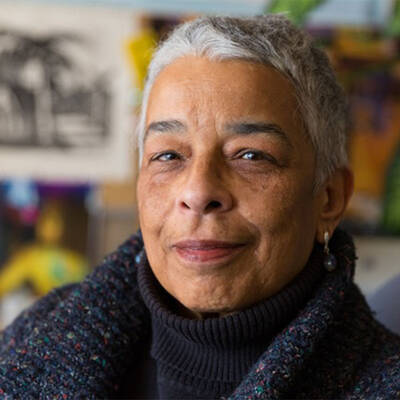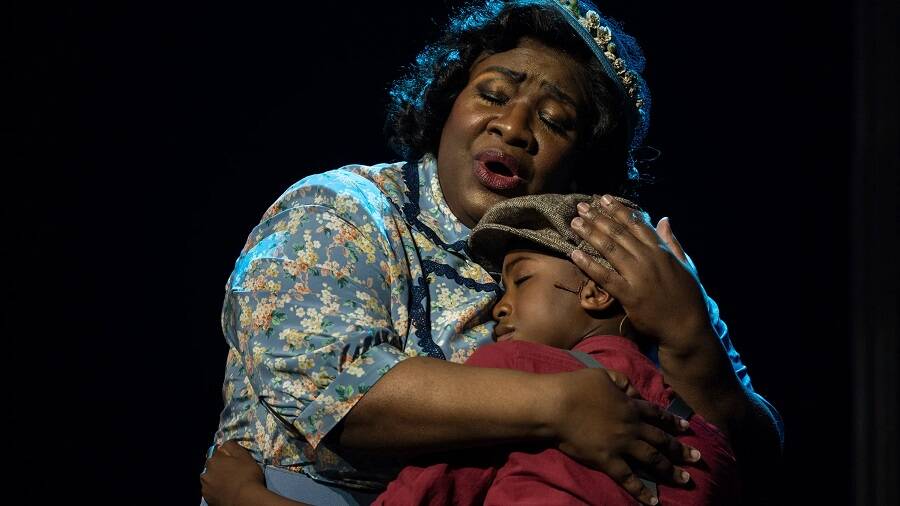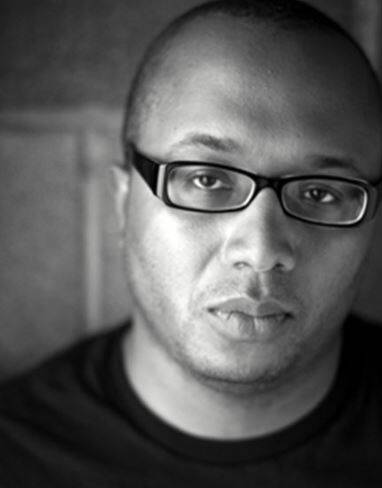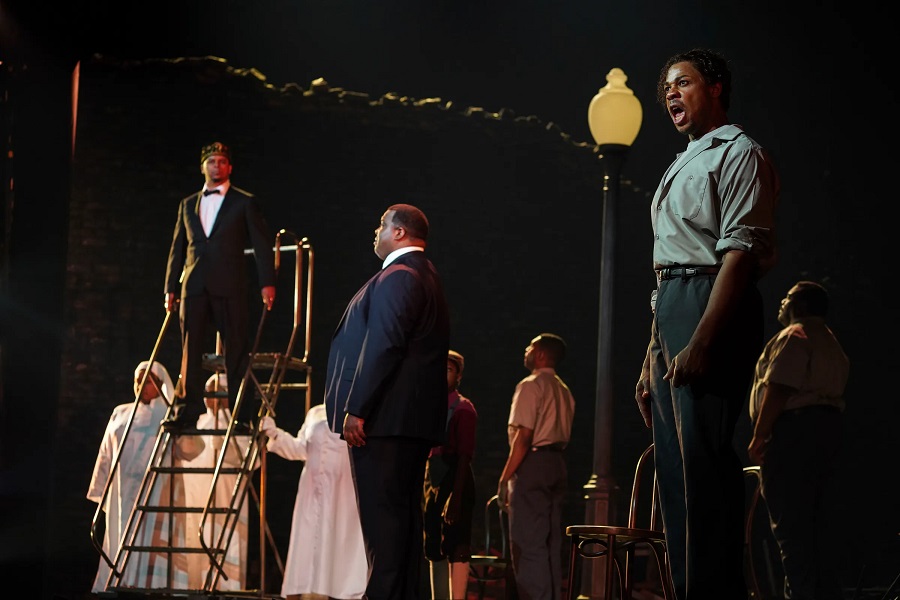Malcolm X is back—in operatic form, at least. X: The Life and Times of Malcolm X, with a score by composer Anthony Davis and a libretto by playwright Thulani Davis, scored a somewhat hollow triumph with its official 1986 New York City Opera premiere, garnering positive reviews and some regional productions, as well as a return to NYCO in an abridged form in 2010, but never quite becoming a staple of the opera repertoire.
Now a world-class creative team led by director Robert O’Hara is helping put this opera back into national circulation with a run that will culminate with its premiere at New York’s Metropolitan Opera in November 2023, making it only the second opera by a Black composer to be staged at the Met.
The new revival began its journey last May at Detroit Opera, in one of many cities Malcolm X lived. The work’s next stop was the city where the martyred leader was born as Malcolm Little, Omaha, Neb., where Opera Omaha hosts performances this weekend, Nov. 4 and 6. After Omaha, the two-act work goes not only to New York’s Met but also to Seattle Opera and Lyric Opera of Chicago. Organizers say that more opera companies and cities may be added.
Opera Omaha general director Roger Weitz called the revival “a dream project” for the company. The new tour came about when, Weitz said, many “prominent opera leaders” noticed that Davis’s acclaimed opera “hasn’t had a major national push” since its premiere, and that in an age of Black Lives Matters he and others “felt this was an excellent time for this excellent piece to be back in the national spotlight.”
X is in large part a family creation of remarkable talents: Composer Anthony Davis’s brother, Christopher Davis, wrote the opera’s story, and the librettist, well-known playwright Thulani Davis, is a cousin. And this isn’t the composer’s first go-round with Opera Omaha, which commissioned the opera Wakonda’s Dream, about another civil rights figure with ties to Nebraska, Standing Bear, from him in 2007.
Anthony Davis came of age in the Civil Rights struggle of the 1960s, in which Malcolm X was a lightning rod, often cast in contrast to more mainstream leaders like Martin Luther King Jr. Malcolm’s message of Black self-sufficiency and self-determination has aged particularly well, the composer feels.
“He’s such an important symbol, and his message lives on in a very real way that resonates in our political life today,” he said. “You can’t imagine the Black Lives Matter movement, for example, without Malcolm X. He is also a figure who’s transnational. He’s not only someone who affected our struggle here in America but also in South America, South Africa, and all over the African diaspora and the Arab world.”
Known for addressing political subjects in his work, Anthony found a throughline of music in Malcolm’s life that resonated with his own jazz heritage.

“What I was struck by in his autobiography were all his references to music, and that Malcolm was around music all the time,” Anthony said. He even felt that Malcolm’s political development paralleled some of the developments in jazz, from “the end of the Big Band and swing era into bebop and the more avant-garde and modal jazz of the ’60s.”
Anthony noted that jazz pianist Billy Taylor, who once hosted a popular jazz program on WLIB in New York, wrote in his biography that he would chat with Malcolm X about jazz when the leader visited the station to deliver commentary. Indeed, on Sundays in the 1960s, young Anthony would often listen to Malcolm X, then Taylor’s program, back to back. Then and now, he said, “I could imagine John Coltrane playing a set and Malcolm there listening to it. I felt this real connection to the music of that period—John Coltrane’s ‘A Love Supreme’ and ‘Alabama,’ and at the same time to the political messages of Charles Mingus. That was really important music for me in my development as a composer and musician.”
It was his brother Christopher Davis who first suggested that the life of Malcolm X would make a good musical. That immediately made Anthony think of the “historical parallel between the evolution of the music and the evolution of political thought. I thought that was a very interesting starting point. I later found even deeper musical connections—the idea of the rhythmic impetus, about exploring American violence and about how violence is represented in music, and the idea of using repetition and repeating those riffs as kind of a rhythmic engine for the music.”
This kind of exploration demanded a bigger form than the musical theatre, Anthony felt. “I immediately thought of it in terms of an opera, because I thought of Malcolm X as a tragic hero.”
Though he’d written large-scale orchestral works before, X was his first opera. In the process he said he discovered, “Writing an opera is like being aboard a freight train. It has its destination. You find the music is just like beating the beat. It has a kind of inevitability about it as you move toward the conclusion, especially in a tragic opera like this.”

His cousin Thulani Davis met his efforts with her libretto, using “very different styles of poetic expression,” Anthony said. “That’s one of the miracles of the libretto—what I was doing in music in terms of the parallel historical development of music you see in the poetry.”
“I set rhythms and I try to envision the whole story in terms of the rhythms,” Thulani said. “Like, are we starting slow and gentle? Where does it get intense? Where does it speed up? Where’s the speech faster? The reason we work together so well is the emotions he expresses in the music are so close to the ones I’m writing that it always feels like it matches.”
She gave an example of a pivotal early ballroom scene, which she “wrote all in blues rhythms, and in a language that resembled how hipsters talked in the ’40s. Anthony saw that and he said, ‘Oh, this is blues and bebop.’ He could hear that—that’s his gift. He could use it as the dance hall music, which is what he wanted.”

Just as X marked the first opera by the Davises, it’s also the first opera to be directed by O’Hara, who’s best known as the director of Slave Play on Broadway, as well as the Public Theater’s current production of A Raisin in the Sun, and who is also an award-winning playwright (Insurrection: Holding History, BootyCandy, Barbecue).
O’Hara said that while he knew the X opera existed, he only sampled it for the first time when commissioned to direct it. “What excited me about the opera in listening to it is that it didn’t sound like what I thought an opera would sound like,” O’Hara said.
As he dove into research about the opera’s subject, O’Hara was struck by “how transparent Malcolm was about his upbringing and his experiences before he became a Muslim. He was a crook, he was a pimp, he was a drug addict. He was very smart, though a high school dropout. He beat women. He was fascinated with, hung out, and had plenty of relationships with white women.”
In short, O’Hara continued, “He did a lot of stuff that allowed him to see a lot of the world from different viewpoints that influenced, I think, his stance on race and also gender. In a lot of ways there’s a level of sexism involved in his early behavior and his thoughts about women. And I think that all made him much more human to me, and not some mythological figure. I think it humanizes our idols to actually sense they are just like us, they have the same vices we all have, they have the same issues and concerns we all have. They’re not superheroes.”

Bringing an operatic hero down to earth may seem a counter-intuitive approach, and O’Hara acknowledged that the opera addresses Malcolm’s vices “in a very abstract way. The opera telescopes a lot of the story of Malcolm X. It’s not a direct bio opera, but it’s more of an X experience.” But he keyed into a thread that the Davises had included in the original: the sense in which, in Malcolm X, “you can see how one can evolve in various ways of understanding. That is what’s so powerful about the message to me of the Malcolm X story: It’s an evolution. His liberation evolved, so I think there is that lesson in that one can actually learn as one teaches.”
Thulani Davis believes that the key to understanding Malcolm X’s persistent appeal 57 years after his assassination is his unadorned authenticity at every stage of his thinking.
“I think one of the reasons he’s remained an icon over the years,” she said, “is that his life experience prior to becoming a leader is the experience of millions of people who experienced discouragement in school, being targeted hanging out on the street, lack of economic opportunities, going to jail. That’s sadly a common narrative of the youthful years of millions of people in this country and elsewhere. So I think his authenticity to speak for their experience still matters.”
O’Hara said that, for all the activism we see today, we’re missing figures like Malcolm X, whose charisma is matched by a rallying cry for proactive change.
“We don’t actually have, I believe, any sort of leaders now that could walk through the streets and gather thousands around them, unless you’re a pop star,” O’Hara said. “Political, civic leaders that could stand on the corner and galvanize a group of people—we don’t have that type of individual anymore. We have the internet, we have TikTok, we have likes, and we have cancel culture.
“But there’s something about the idea of one man who has that ability to force another group of people to see them as who they are. That’s what’s exciting to me: the futurism of Malcolm X. He did not care about whether your feelings were hurt or not. He cared about the truth of the situation and what was actually happening in front of him.”
Like Malcolm, the opera X is also changing: Anthony Davis has cut its length from three acts to two, and said he’s still tinkering as the production moves from city to city. But the opera’s relative obscurity is something its subject would likely have had a few choice words about.
“There’s not a lot of opera companies doing Black composers,” O’Hara said. “This production legitimizes, but no one should be patting themselves on the back that it’s happening, because it should have happened a long time ago.”
Leo Adam Biga (he/him) is an Omaha-based freelance writer and the author of the 2016 book Alexander Payne: His Journey in Film.


